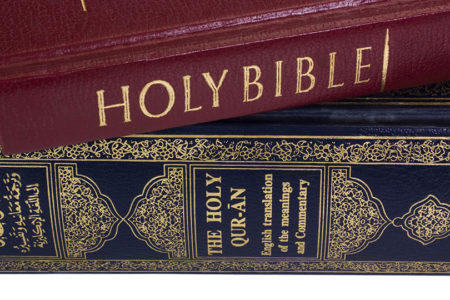Two Types of Sons Galatians 4:19–31
The joys of giving birth are great, but so can be the agony in guiding that child to maturity. What is true in the physical realm is also true in the spiritual realm. Paul rejoiced over the spiritual birth of the Galatians, but, like a mother in great travail for a wayward son, he struggled to guard his children from the corrupt teachings of the Judaizers.
Before concluding his defense, the apostle gave one final warning to the Galatians, a warning couched in a pointed analogy between Hagar and Sarah and their two sons, Ishmael and Isaac. The warning beautifully illustrates the differences between the legalistic bondage being promoted by the Judaizers and the freedom the Galatians enjoyed in Christ. But first, Paul took off the hat of a stern theologian and put on the hat of a loving pastor as he corrected his spiritual children.
Paul’s Compassion
With deep affection, the apostle wrote, “My little children, of whom I travail in birth again until Christ be formed in you” (v. 19). The phrase little children, used only this one time in Galatians, means dear born ones and expressed Paul’s deep concern for their welfare. He had travailed in giving new birth to them, but once again he travailed over their well-being. The Galatians were making the maternal heart of Paul undergo birth pains a second time. This was abnormal and unnatural, making him feel like a mother who had to deliver the same baby twice.1
But Paul was willing to suffer along with the Galatians “until Christ be formed in” them. The word formed means transformed or a metamorphose of Christ-likeness taking place in their spiritual lives. In other words, he desired that Christ be completely formed in the believers (Gal. 2:20), making them immune to the Judaizers’ false doctrine.
For some reason, Paul was unable to visit the Galatians, but he wanted to be with them to “change [his] tone” (v. 20). It is always better to deal with a problem face to face rather than from a distance, for then people can put more heart into their voices, something that is impossible to do by letter.
Because the Galatian believers leaned toward the Judaizers’ position, Paul stood “in doubt [perplexed] of” them (v. 20). He was at his wit’s end, puzzled at just how to find a way to once and for all convince them to leave the error of legalism.2
Portrait of Comparisons
It has often been said, “A picture is worth a thousand words.” In order to indelibly etch his point on the Galatians’ minds, Paul drew upon a well-known incident from the Old Testament as a fitting illustration and conclusion to the matter of Law and grace, hoping that this would forever wean them away from the Judaizers’ error.
The illustration centered on Abraham’s two sons and their mothers, which Paul called “an allegory” (v. 24). An allegory can be defined as “a narrative or word picture, which is an extended metaphor, either true to life or fictitious, with many parts pointing symbolically to spiritual realities, designed to teach spiritual truths by comparison.”3 Thus, the passage can be read on either a literal or symbolic level. By calling this section an allegory, Paul was in no way doubting the literal interpretation of the Genesis account or its historical trustworthiness. The words “Which things are an allegory”4 (v. 24) are better translated “which sort of things are being set forth in allegory.”* In other words, Paul’s allegory was an illustration or analogy in which he pointed out that certain facts about Hagar corresponded to non-believers, while certain facts about Sarah corresponded to believers.5
It is important to understand the difference between an allegory and allegorizing. Allegorizing is to take license with Scripture where the interpreter seeks a deeper meaning in the text, often called “spiritualizing.” Paul was not doing this.
Paul’s allegory accomplished seven objectives in his fight against the Judaizers’ heretical position. First, it focused on both Abraham and the Law Judaizers supported both) to prove that justification is by faith. Second, the apostle proved his position by using the Judaizers’ own style of rabbinical exegesis and argument. Third, it illustrated and reviewed all the major points of his position and, by so doing, proved that the principles found in the Law led to bondage, whereas a life of faith leads to freedom. Fourth, the account in Genesis is a very emotional story, providing a fitting conclusion for his argument. Fifth, it pointedly told the Galatians that they should cast out the legalizers. Sixth, the allegory pulled together all of the doctrinal principles and practical applications Paul had been making. Seventh, it led right into the next chapter, in which the apostle began the practical section of his letter.6
The Galatians had not yet adopted the Law, but they were near the point of doing so. Appealing to their intelligence, Paul asked, “Tell me, ye that desire to be under the law, do ye not hear the law?” (v. 21). In other words, Do you really know what you are about to embrace? Do you really know what the Law says? Most likely you do not, because you have not studied its principles or given heed to all of its laws and commands.
The Judaizers prided themselves in being the physical seed of Abraham and partakers of the Mosaic Law. Paul used their background to make our comparisons in contrasting the differences between Law and grace, once and for all negating their legalistic position.
He began by comparing the two conceptions of Ishmael and Isaac (Gen. 16, 17, 21), Abraham’s two sons. First he dealt with the mothers who conceived. Ishmael. Abraham’s first son, was borne by Hagar, “a bondmaid,” and Isaac was borne by Sarah, “a freewoman” (v. 22) who was Abraham’s wife. Hagar was a slave; thus, her son Ishmael was also a slave. But because Sarah was a freewoman, her son Isaac was also free. Surely the Galatians would understand the analogy. By embracing the Law, they portrayed themselves as sons born in bondage, thereby disqualifying themselves as heirs of the covenant promises.
Next, Paul dealt with the manner of the sons’ conception. Ishmael was naturally conceived by Hagar, “the bondwoman … after the flesh,” but Isaac was conceived by Sarah, “the freewoman … by promise” (v. 23). That is, Isaac was born both naturally and through supernatural (miraculous) intervention, because Abraham and Sarah were past the age of childbearing (Gen. 18:11; Rom. 4:18–21). This meant that Ishmael by birth had no share in the inheritance of the covenant promises of Abraham; but Isaac, the true heir by birth (Gen. 21:10), had a right to the covenant promises. In like manner, the Judaizers were trying to give legitimacy to their position of adding Law to grace as the only means by which eternal life could be inherited. But, as Paul argued, this was impossible, for the Law brought about bondage and could never impart spiritual life (Gal. 3:21), righteousness (Gal. 2:21), the gift of the Spirit (Gal. 3:2), or spiritual inheritance (Gal. 3:18).7
Paul’s second comparison was of the two covenants. The Mosaic Covenant, was made at “Mount Sinai, bearing children for bondage, who is Hagar” (v. 24). Although not stated, the other covenant was made with Abraham, which was a covenant of grace and promise representing Sarah. In other words, Hagar produced children born into slavery, as did the Mosaic Covenant, which was based on the Law. But Sarah produced children of freedom through the Abrahamic Covenant, which was based on promise. “Whosoever chooses Hagar (Law) for his mother is going to experience bondage (Gal. 4:8–11, 22–25, 30–31; 5:1). But whoever chooses Sarah (Grace) for his mother is going to enjoy liberty in Christ. “God wants his children to be free,”8 wrote Dr. Warren Wiersbe.
Paul’s third comparison was of two cities. “Hagar is Mount Sinai in Arabia, and answereth to Jerusalem which now is, and is in bondage with her children. But Jerusalem which is above is free, which is the mother of us all” (vv. 25–26).9 In this section, Hagar stood for the Mosaic Covenant ratified at Mount Sinai; her son Ishmael stood for Jerusalem, which was in bondage to the Romans, stripped of freedom, and under the Mosaic Law. Sarah represented (although not stated; cp. Heb. 12:18–24) the New Covenant ratified by Christ’s blood on the cross; her son Isaac stood for the heavenly Jerusalem, which is free from the Law, slavery, fleshly works, and unrightousness, and is the dwelling place of God and departed saints.
It must be remembered that the two sons had the same father but different mothers. Although they had a similar heritage and environment, they were completely different in nature. Paul’s point was that it is not enough to claim the same father; both Jews and Christians can do that. But to which mother were you born? Those born to Hagar are in bondage and have no part in the inheritance of the heavenly Jerusalem. Those born to Sarah are sons of freedom and heirs of the promised inheritance, the heavenly Jerusalem.
Paul’s fourth comparison was of the two types of children coming from the two women. Quoting from the Septuagint version of Isaiah 54:1, he wrote, “Rejoice, thou barren that bearest not; break forth and cry, thou that travailest not; for the desolate hath many more children than she who hath an husband” (v. 27). Originally, Isaiah’s prophecy referred to Israel before, during, and after the Babylonian captivity. But in this context, Paul applied the verse to Sarah and Hagar’s spiritual offspring.
Sarah, who was originally barren, eventually gave birth to a son, and in time her descendants outnumbered those of Hagar. The point of Paul’s analogy was that God has supernaturally intervened to give spiritual birth to the church, made up of both Jews and Gentiles who will greatly outnumber those living in bondage under the Mosaic Law.
Practical Conclusion
Paul concluded his argument by presenting three personal applications. First, he compared the children: “Now we, brethren, as Isaac was, are the children of promise” (v. 28). Isaac, born of Sarah, the freewoman, was a son of promise who was supernaturally conceived. In the same manner, all believers are supernaturally conceived through the new birth (Jn. 3:3, 5) and are spiritual seed of Abraham and heirs according to promise (3:7–9, 18, 29). Paul was speaking of the time when believers will stand before God. Their fate will not rest upon their spiritual descendants or Law-keeping but upon the unconditional aspect of the promises given to Abraham by grace.10
Second, he mentioned a spiritual conflict being waged: “as then he that was born after the flesh persecuted him that was born after the Spirit, even so it is now” (v. 29). Paul was referring to the persecution of Isaac by Ishmael (cp. Gen. 21:8–9). He paralleled this persecution with the conflict he and the Galatian believers were suffering at the hands of the Judaizers. The Judaizers (a type of Ishmael) were born out of legalistic self-effort and were persecuting Paul and all true believers (a type of Isaac) who were born by grace through faith.”11
Third, in contrast to the attitude of the persecutors was the command from God, “Cast out the bondwoman and her son; for the son of the bondwoman shall not be heir with the son of the freewoman” (v. 30). Although these words were originally uttered by Sarah, God confirmed that Abraham should follow Sarah’s desire (Gen. 21:9–10, 12). It was self-evident that the two sons and their mothers could not dwell in the same household, for the older, Ishmael (about 17 years of age), would mock and corrupt Isaac, the true heir of the Abrahamic promises. The break was to be permanent: “Cast out the bondwoman.” It is not possible to mix or reconcile Law and grace or faith and works. Legalism, as a way to gain favor with God or a rule of life, must be once and for all expelled and excluded from the lives of believers.
Paul brought his argument to a climactic conclusion with the words, “So then, brethren, we are not children of the bondwoman, but of the free” (v. 31). Simply put, all true believers have been liberated by Christ; they are to stand in this liberty and never embellish it with legalism.
The apostle provided a choice for the Galatians that applies to us today. Do we want to be sons of Ishmael, who was conceived after the flesh, whose mother was a slave, who lived in the bondage of an earthly Jerusalem, and who was under a covenant of legalism? Or do we want to be sons of Isaac, who was conceived through supernatural intervention, whose mother was free, who was positioned in the heavenly Jerusalem, and who was under the New Covenant of grace? The choice is yours! Whose son are you?
ENDNOTE
- John MacArthur, The MacArthur New Testament Commentary, Galatians (Chicago, IL: Moody Press, 1987), 120.
- Ibid., 122.
- Roy B. Zuck, Basic Bible Interpretation (Wheaton, IL: Victor Books, 1991), 221.
- C. Fred Dickason, Jr., From Bondage to Freedom, Studies in Galatians (Chicago, IL: Moody Bible Institute, 1963), Part II, 6.
- Op. cit., Zuck, 47.
- James Montgomery Boice, The Expositor’s Bible Commentary, Galatians (Grand Rapids, MI: Zondervan Publishing House, 1976), Vol. X, 482.
- Warren W. Wiersbe, The Bible Exposition Commentary, Galatians (Wheaton, IL: Victor Books, 1989), Vol. I, 713.
- Ibid., 713.
- Lehman Strauss, Devotional Studies in Galatians and Ephesians, (Neptune, NJ: Loiseaux Brothers, Inc., 1957), 69.
- Op. cit., Dickason, 9.
- Donald K. Campbell, The Bible Knowledge Commentary, Galatians (Wheaton, IL: Victor Books, 1983), Vol. II, 604.








